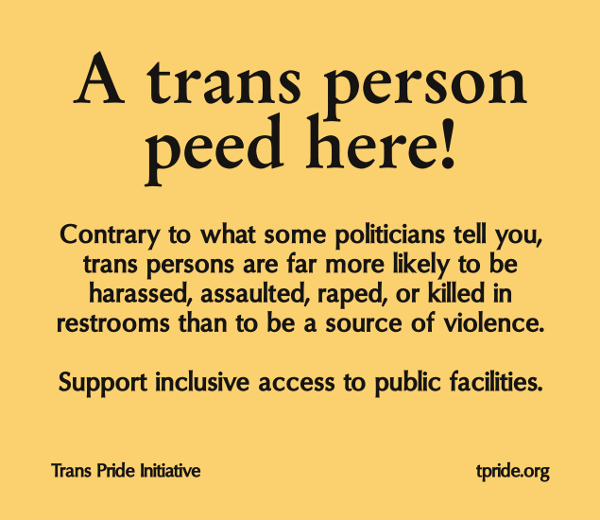
The Gender Justice! project is a guerrilla marketing type campaign to leave information drops about discrimination in restrooms to spread the word that trans persons are likely to experience violence in public facilities when denied affirming access to gender-segregated spaces. The drops are available for allies or trans persons, and can be printed front and back with Spanish on one side, English on the other. If you email info@tpride.org with a request for drops and an address to send them to, we will send you some drops for free! Templates for printing your own are below.

NOTE: As of August 20, 2024, the Texas Department of Public Safety (DPS) is abusively, and with deliberate and intentional malice, refusing to accept court orders for gender marker corrections. Note that DPS has stated " If a single court order contains both a name change and a sex change, we cannot accept the order." For the time being, you may want to still seek a court order for a gender marker correction, but it would be a good idea to get separate orders for the name change and gender marker correction.
In Texas, changing your name is an established procedure that is fairly simple, and it should be no problem for trans persons. However, there is currently no set procedure for gender marker changes. During prior sessions of the Texas legislature, bills have been introduced to establish such a procedure, and bills will continue to be put before the state legislature. At this time, individual judges decide whether to allow gender marker changes as well as the requirements that must be met to grant changes.
Trans Pride Initiative has brought together some information if you choose to try to file for the name and gender marker correction yourself (called a pro se filing). Our “Name and Gender Marker Change, Dallas County” brochure is a PDF document suitable for printing that includes instructions. However, there will be some changes over time, so not everything will be exactly the same as that described as it was in 2017. Below are several templates that might be useful in the preparation of your petition and order.
If you would like to try to have the filing fee waived because you have limited or no income, you can use the Statement of Inability to Afford Payment of Court Costs or an Appeal Bond, and listed in the above table; it is also available at the office of the County Clerk. The clerk's office may ask you to fill it out there to make sure you have the up-to-date version. It should be authorized while you wait, and the judge generally approves later.

In late 2015, there were changes made to the way birth certificates are modified. In the past, using a court order to change a birth certificate meant the document was “amended,” so an original was kept and an amended certificate was produced. The “short form” birth certificate would only show the information as amended, but the “long form” birth certificate would show the original and amended version, outing a trans person.
Currently, you may request that the original birth certificate be sealed (meaning only those with a court order may access), and the birth certificate be reissued, essentially providing a new birth certificate. According to attorney Katie Sprinkle, these are the steps to have the original sealed and the new birth certificate “reissued.” Visit this Department of State Health Services Vital Statistics page to download this form:
Please note that these files do not serve as legal advice. We have simply brought together some information to help you develop your pro se filing. If you have any questions or concerns, you should contact an attorney. Also, this should generally be the same procedure in all Texas counties, but details will vary.
One additional note, if you have been convicted of a felony, you must wait two years after the completion of all terms of your sentencing to apply for the name and gender marker correction. TPI is helping challenge this restriction as unconstitutional. Form more information see our Project 103. If your sentence is adjudicated, you should be able to petition a court as soon as you complete the terms of your sentence. However, TPI advises folks to contact an attorney to discuss your specific situation related to any convictions.

PLEASE NOTE: Our Document Update Assistance program is not available at this time due to lack of capacity to manage the program. We will consider restarting the assistance when we have the capacity to do so.
Trans Pride Initiative is offering assistance paying for various costs related to updating the name and gender marker on various types of identification and legal documents. The program is under development and will probably change over time, but currently these are the main features:
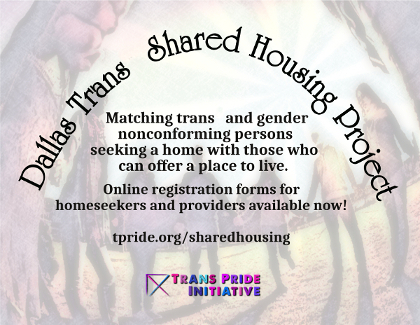
PLEASE NOTE: The Dallas Trans Shared Housing program is not available at this time due to lack of capacity to manage the program. We will consider restarting the assistance when we have the capacity to do so.
The sharied housing project is a mutual aid shared housing program intended to pair persons willing to open their houses to trans persons in need with those who have a need for greater housing stability.

On March 5, 2012, HUD's Equal Access to Housing Final Rule went into effect. The rule states that all HUD core programs are open to eligible persons regardless of sexual orientation, gender identity, or marital status.
The rule was lacking in specific trans protections, and HUD said it would track whether shelters voluntarily complied to determine if a specific trans rule was necessary. Shelters did not comply and continued to deny trans persons appropriate shelter access, and HUG issued the Equal Access in Accordance with Gender Identity Final Rule in 2016.
See the following for additional information about these rules:
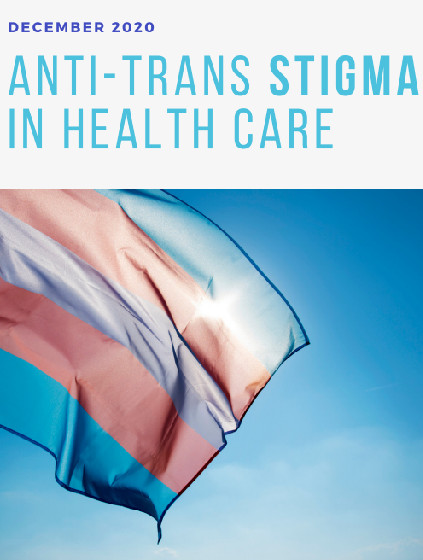
Anti-Trans Stigma in Health Care, 2020, by Kat Jimenez (PDF file, 5M): Student and Healthcare Committee member Kat Jimenez requested that TPI host a research project for their master's thesis study in Applied Anthropology at the University of North Texas. The study interviewed health care professionals and trans persons to investigate how felt, enacted, internalized, and structural stigma impact trans and gender diverse persons when accessing healthcare. The thesis project included the development of a report for TPI discussing the findings, which we are proud to make available here!
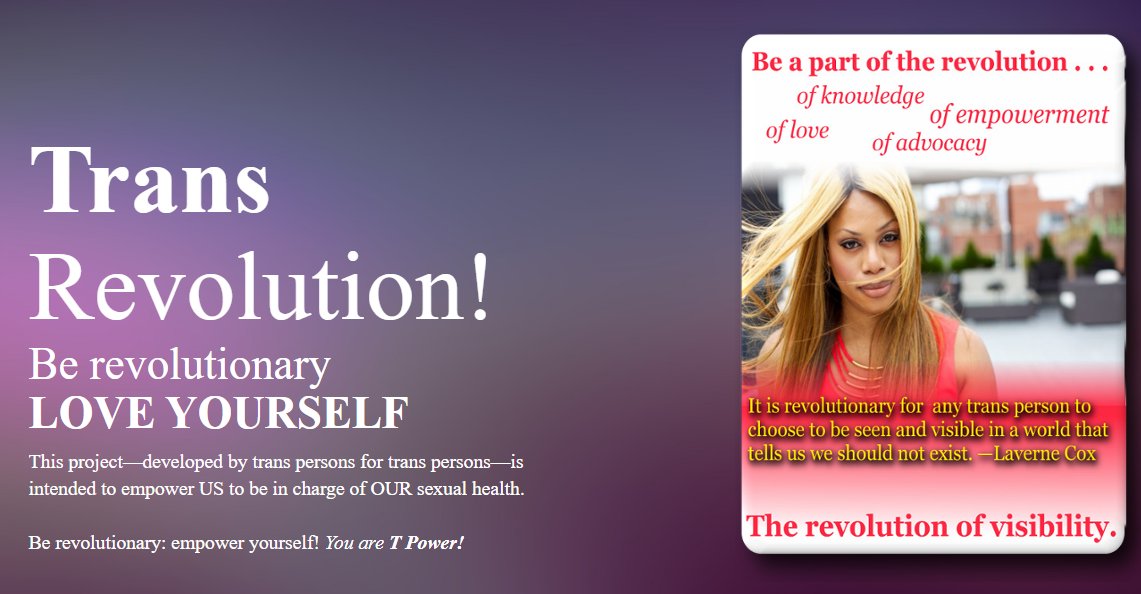
TPI's Trans Health Empowerment web site provides information about HIV and STI risks specifically for and about trans persons. Learn about OUR sexual health. WE empower OURSELVES through knowledge.
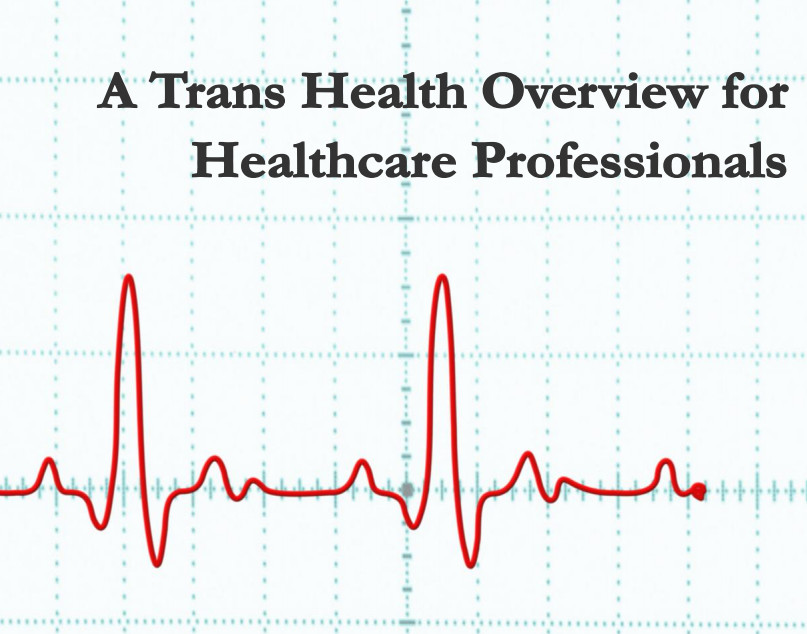
A Trans Health Overview for Healthcare Professionals, 2012, by Trans Pride Initiative (PDF file, 1.2M): The target audience for the brochure is persons involved in healthcare who have had limited interaction with trans persons. The first three sections provide an overview of the trans community. Included are some general definitions, a brief section about who trans persons are demographically and culturally, and introductory information about healthcare concerns and risk factors. The next two sections cover cultural sensitivity in healthcare settings, and best practices for collecting data and asking sensitive questions.

TPI has produced two flyers concerning the dangers of silicone injection. The first is a “Wanted: Perfect Curves” poster intended as a simple, easy to read flyer suitable for handing out at conferences and events. The flyer has English on one side (or page, depending on if you print double-sided), and is available in color and black-and-white.
The second flyer has more detailed information about some of the risks so that trans persons considering pumping with silicone can make better informed decisions. The flyer is not comprehensive, but is a quick overview of the risks and a few things to consider if you do decide to pump.
Both these resources were created in 2012.
Intimate partner violence (IPV), also called domestic violence, is often portrayed as a problem perpetrated by [cisgender] men against [cisgender] women. That is certainly a prominent characteristic of IPV, but the stereotype tends to hide relationship violence that does not conform to this pattern.
Trans persons experience high rates of IPV. Little research has been undertaken to study IPV as experienced among the trans community. Due to social stigma, many trans persons may feel the violence they experience is deserved or an aspect of relationships they will just have to endure because of their gender identity. Worse, few services are available to provide appropriate care for trans persons needing assistance dealing with IPV situations.
One group that is working to address issues in IPV related to trans persons is FORGE, a social advocacy organization in Wisconsin. FORGE provides training, including online webinars and anti-violence related publications on a variety of topics ranging from help for service prividers to self-help guides for community members.
In 2013, in response to the exclusion of trans women from local women-only IPV shelters, TPI created a document meant to answer questions and push for acceptance of trans women in these shelters. Trans Women in Women-Only Domestic Violence Shelters (PDF file, 288k) was used to respond to a number of questions posed during the discussion with one specific shelter provider. Presented in a question-and-response format, the brochure provides data on the incidence of IPV in the trans community and various considerations pertinent to providing shelter to trans survivors of domestic violence.
.jpg)
Published in 2015, TPI's Workplace Policy for Trans Employees (high resolution PDF, 4M; web resolution PDF, 2M) was initially created specifically for the City of Dallas during our efforts to push them toward more trans-affirming employment practices. Later, discussions with staff at Aids Healthcare Foundation concerning their efforts to improve their policy concerning trans employees resulted in TPI revising the document for general application. The document covers workplace policy for trans employees in a variety of situations and workplace environments. Adaptable to small or large employers, the document addresses issues ranging from employee respect to considerations in licensing and legal documentation.